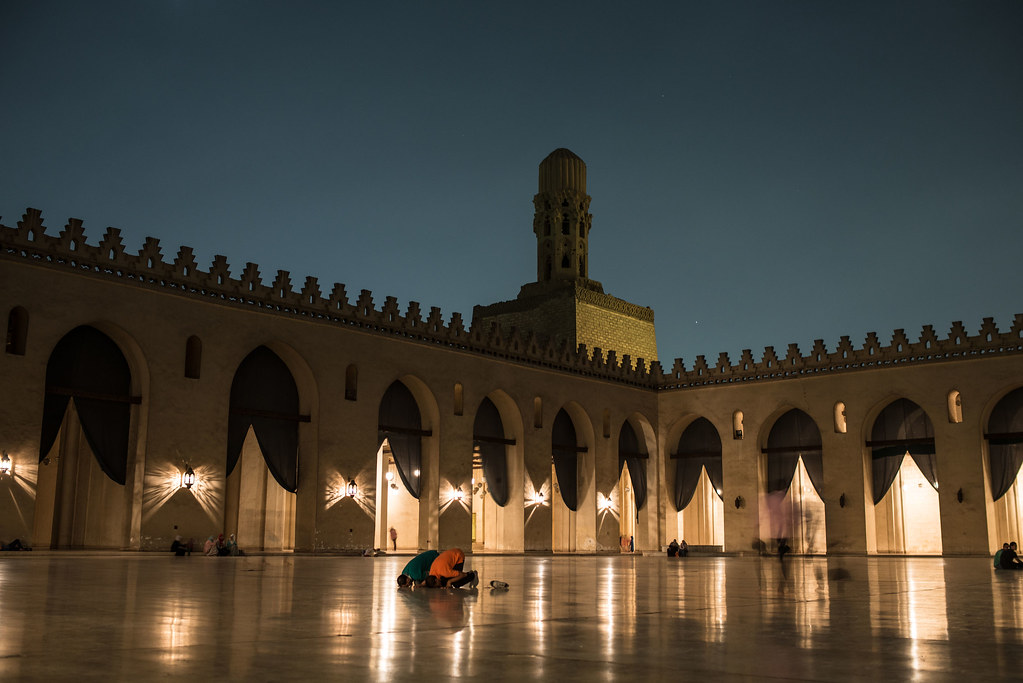Some people don’t consider Ramadan to be a holiday. To them, a holiday is a day off from school or work, or a time to give or receive gifts. So a month of hunger, thirst, and exhaustion doesn’t exactly scream celebration. But to me, and many other Muslims around the world, Ramadan carries the same magic, love, and happiness that other holidays do. Ramadan occurs during the ninth month of the Islamic lunar calendar. During this time that is considered the holiest month by Muslims, those who observe the holiday take the time to reflect, detox, and engage in charitable behaviour. Fasting is one of the most important aspects of Ramadan. Many people associate Ramadan with a fast from food and drink, in which one begins their fast at sunrise (suhoor) and breaks it at sunset (iftar) every day for about a month. However, fasting goes beyond just food and drink, as Ramadan is a detox of the body and soul. To achieve this, Muslims also fast from unhealthy habits such as smoking, drinking, and rude behaviours. In addition to fasting, another central element to Ramadan is charity. This practice of sadaqah encourages charitable behaviour and donations, such as donating food or money to the less fortunate, as well as non-physical or monetary actions such as giving others compassion, love, and generosity. Through fasting and charitable actions, Muslims achieve closer connections to their religion, to their communities, and to themselves.
During this time that is considered the holiest month by Muslims, those who observe the holiday take the time to reflect, detox, and engage in charitable behaviour.
When I tell people I am fasting for Ramadan the most common question I get is why? Why do I, and many other Muslims, do something as difficult and draining as fasting for most of the day? There are many reasons. The detox we engage in has tremendous physical and mental benefits. As many scholars have begun to notice recently, fasting can be very healthy for our bodies. Fasting from food and drink allows our bodies to break down stored fat for energy which can reduce the risk of cholesterol, high blood pressure, and diabetes. Furthermore, it allows people to break unhealthy habits such as smoking or drinking which can significantly improve someone’s physical health. Mentally, Ramadan can also be incredibly beneficial. The heightened spirituality we experience during the month allows greater feelings of peace and comfort during hard times. The increased charity and community participation we partake in fills us with more endorphins and soothes feelings of anxiety or loneliness. Through avoiding bad habits like gossiping or fighting, and improving our kindness and patience, we become better versions of ourselves and deal with conflict or stress in healthier ways. So, while Ramadan can be difficult and draining at times, I, and many other Muslims partake in it to cleanse ourselves from bad or damaging habits and reap the many physical, mental, and spiritual benefits this month offers.
Although it is very easy to be overwhelmed, students who observe the holiday should take special steps to ensure that they are prioritizing their physical and mental health while still enjoying this spiritual time.
Coming to university opens doors to many new experiences. Every holiday you celebrate carries new traditions and emotions –– our priorities during Halloween go from [childish/childhood] candy-collecting strategies to coming up with costumes that can survive a rowdy frat party. St. Patrick’s Day suddenly becomes relevant to those who are old enough to drink, Irish or not, and Easter turns into a much-needed mental health break pre-exams. Ramadan is no different. When I first came to McGill last year, I was shocked at how different the experience was. Instead of the warm dinner feast and never-ending desserts to break my fast on, I found myself eating cold cafeteria food and pre-packaged sandwiches. Suhoor was not shared with family members who joined me in stuffing their faces and drinking as much water as they could before sunrise, instead I ate quietly in the dark and listened to my roommate snore. This unfortunately hasn’t changed much this year. Despite having my own place and no longer being confined to overpriced cafeteria meals, it’s hard to find time to rest, cook, and reflect when this year’s Ramadan coincides with finals season. Staying up until 4am to eat before sunrise, then waking up at 8:30am to attend class and then spend the rest of the day writing essays, completing projects, and studying for final exams is so draining when you haven’t had any food or drink. As a student, this holy month seemed to drain all of the excitement and love it should have. Instead, it felt lonely and exhausting. However, with time and experience, I’ve learned how to make the most of it. Although it is very easy to be overwhelmed, students who observe the holiday should take special steps to ensure that they are prioritizing their physical and mental health while still enjoying this spiritual time.
My Survival Guide to Observing Ramadan as a Student
- Take Care of Your Body – Ramadan is by no means an easy holiday to partake in. It can be very draining on the body to fast from food and drink all day while maintaining regular activities. Listening to your body is vital in ensuring your physical AND mental health.
- Take Naps & Rest! – especially in the afternoon; in the morning you still have energy from suhoor, but ease up on the activities during the afternoon.
- Be Gentle! – Walking around while fasting is hard, especially during the spring when the days are becoming warmer. If your classes are far, make sure to think ahead and leave for them earlier. Do not overexert yourself.
- How to Study – In the past two years, Ramadan has overlapped with finals season, so not studying is not exactly an option.
- Take Breaks! – it is hard to focus when you’re fasting, as staring at something for hours won’t be effective if you are not giving it the proper attention. This is fine! Just take more breaks, and dedicate a little more days to studying. I do most of my studying between Iftar and Suhoor because that is when I am most energetic.
- Speak to your Professors! – If you cannot attend a class/conference/assessment reach out and explain why, it can’t hurt!
- If you have an exam that falls during Eid, you can submit a religious conflict form!
- Stay Active – It isn’t healthy to decrease activity completely during Ramadan.
- While it may be difficult, it is recommended to not completely cut out any daily exercise you do regularly while not fasting. However, you should reduce your daily exercise amount by 30%.
- When I go to the gym during Ramadan I try to aim at going 30 minutes before Iftar so I can break my fast and hydrate immediately after.
- Prioritize Mental Health
- People often forget that Ramadan is about both physical and mental health. Taking the time to sit and reflect whole fasting can be very healing when it comes to academic stress and worries.
- Be kind to yourself and your body – if you are struggling or need to stop fasting, studying, working out etc. do not feel bad, it is okay to prioritize your mental health and rest.
- It is very easy to feel homesick as a student, especially during Ramadan. I find it especially helpful to cook or buy some sort of comfort meal that reminds you of home. If you can, it can also help to talk to your family, or facetime when you break your fast.
- If you feel lonely, there are also Muslim communities in McGill and Montreal that can help.
- Check out the Muslim Students Association (MSA), they will occasionally host prayers and Iftar.
- There are also many mosques in Montreal that can provide a loving community during this month.
- Choose the RIGHT Food
- In residences
- Residences now offer packaged suhoor take-out meals
- My personal favourite residence suhoor meal was RVC’s triangle turkey sandwiches. They hit even when they’re cold.
- NUTRIENTS!! – The types of food you have are vital during Ramadan.
- Meals should include: whole grains (rice, brown bread), fruit & vegetables, protein (eggs, nuts), and healthy fats (nuts).
- Electrolytes are very important!
- Coconut water contains many beneficial nutrients (Electrolytes, vitamins etc.) AND will hydrate you.
- Prepare meals – With classes and work it’s hard to find time to prepare a meal every night – but that doesn’t mean you just eat whatever is left in your cupboard (toast and cheese is not a sufficient or nutritious meal).
- Cook your meals over the weekend or after Iftar where you have more time and package them for the week
- Do not skip suhoor
- It is very necessary to eat and hydrate yourself during suhoor – even if you feel full you must eat during suhoor to avoid feeling weak, dehydrated, and exhausted while fasting.
- I usually stay up for suhoor because I am never hungry after waking up, and I catch up on my missed sleep right before Iftar.
- HYDRATE!!! – Drinking water is incredibly important to achieve fasting without harming yourself.
- It is best to break your fast with water first, as eating will make you feel full and therefore less likely to drink enough water.
- In the short time you have to eat or drink, you MUST have about 8-12 cups of water.
- In order to ensure I am having enough water, I use a gallon water bottle and finish it throughout the night.
- In residences
What someone who doesn’t observe Ramadan can do:
- Be Understanding:
- It’s hard to fast – be patient with your friends – they won’t always be free or as energetic as they used to be.
- Be Kind
- Don’t make assumptions about fasting – I have been told by many people that fail to understand or educate themselves about Ramadan that it is unhealthy and dangerous. This is not true – fasting can be difficult and tiring but when done correctly it also has many benefits on physical and mental health as I’ve outlined.
- Most Importantly, Feel Free to Participate!
- Ramadan is not just limited to those who practice it. Ramadan is a communal holiday, just because you aren’t fasting don’t think you can’t participate. If you have friends fasting or observing Ramadan don’t feel shy about asking about it or even trying it out.
- One of my favourite parts about Ramadan is the massive amounts of food you can gorge on after breaking your fast – this part can easily be shared with others – eat with your friends!
Ramadan Kareem!








